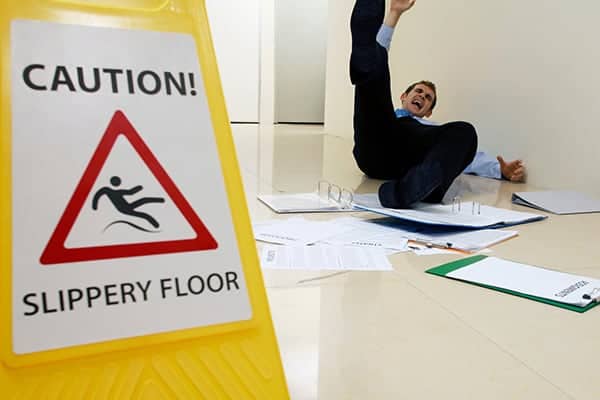
Guide to insurance for trades professionals
Posted on 29th June 2022 by Phil Ainley

According to the Office for National Statistics (ONS), in Q4 of 2021 (Oct to Dec) there were approximately 4,184 million self-employed professionals in the UK. Of this total, 798,000 worked in construction-related professions, including: painters and decorators, electricians, plumbers, plasterers, brickies, chippies, and handymen to name but a few!
Why do trades professionals need business insurance?
Whether you’re one man with a van or an established firm that’s been around for decades, your trades business needs to be protected in case of errors, accidents, theft or damage with trades insurance.
If you’re not holding the correct level and type of trades insurance, you risk losing a lot of money and putting your business in danger.
Holding the correct insurance for your business is about more than just peace of mind. It shows your customers how professional you are, in that you care about your business and the welfare of your customer’s projects and their property.
Should something go wrong with a project, your insurance will help get your business back quickly and keep customer’s projects on track and your reputation intact.
This guide has been written specifically with trades professions in mind, to explain the insurance protection on offer and how each policy is of benefit to your business.
Trades Public Liability insurance
By the very nature of your profession, tradespeople interact with the general public on a daily basis. As a trades professional you’re either working on jobs in customers’ homes or you’re working with other tradesmen on commercial construction sites. As a result, Public Liability insurance (PL) is the most common type of insurance that trades professionals need.
Public Liability insurance provides cover for your business should a claim be made against you for damage to a customers’ property whilst working on a job for that customer. It will also cover you if you are alleged to have caused an accident such as a member of the public tripping over your toolbox and injuring themselves in the process.
A couple of examples could be:
You are working on a construction site operating plant machinery. You forget to properly safeguard a machine after using it, which causes an accident, injuring another site worker and damaging the equipment. The client you are working for makes a claim against you for damages, while the other site worker makes a claim against you for compensation.
You’re a plumber who is called out to a customer’s house to install new pipework. You accidentally cause a flood which damages the carpets in the customer’s home. As a result they make a claim against you for the cleaning or replacement of the damaged carpets.
Products Liability insurance
This policy will cover your legal liability for damages and costs awarded against you arising from any claim made due to:
- injury to any person
- loss or damage to material property
occurring anywhere in the world during the period of insurance by the nature or condition of any product initially sold or supplied by you from within the UK.
Trades Professional Indemnity insurance
Professional indemnity insurance (PI) protects your trades business if a client is unhappy with your work or advice. It will cover legal costs and expenses in defending a claim as well as compensation due to your client for loss or damages.
Examples could include incorrect designs, not using the correct materials as detailed in the specification, misinterpreting a design or misreading measurements in a design resulting in a project not being fit for purpose.
Standard professional indemnity policies may exclude any claims relating to an incorrect design, build, maintenance work or installation. Trades professional indemnity policies are worded specifically to cover these types of claims to provide cover for costs incurred in remediation work or mitigating a loss or potential loss that may otherwise result in a claim.
Employers’ Liability insurance
Many tradespeople work for themselves and work alone, but there are also many instances where tradesmen take on an apprentice, junior staff, admin staff, and some even grow their businesses to become micro/small operations with five or more members of staff – especially those who undertake larger projects such as house builds and conservatories.
If you employ staff you are responsible for their health and safety while they are at work. Your employees may be suffer injured or disease whilst in your employment, or your former employees may contract a disease as a result of work they undertook while in your employment.
Employers’ Liability insurance (EL) is a compulsory insurance requirement under the Employers Liability Act (1969) and is a criminal offence not to carry cover if you employ staff. The legal minimum of cover is £5million.
The policy will enable you to meet the cost of compensation for your employees’ injuries or disease. Cover can include medical costs, legal costs, and loss of income, as well as other damages.
As an example, your employee could fall from a ladder. Or it could be an employee working with drills for hours resulting in them suffering a repetitive strain injury.
Buildings & Contents insurance
If you own premises, ensure you carry buildings cover to protect against theft and damage. Whether you work in an office or from home, contents insurance will cover your office contents including computers, furniture, stationery and documents whilst within your property, including risks such as theft, fire, water damage from burst pipes and malicious damage.
You may not own business premises, but your company might own expensive contents such as laptops, mobile phones, and other equipment. In which case contents insurance would still be an advisable way to protect your property.
Tools and trades materials insurance
Tool theft is common, so it pays to have your tools insured. The average tool theft claim in the UK is now estimated at £1,692 according to research by Powertools2U.
Extending your policy to include tools insurance could save you thousands of pounds, eliminate stress and help you get back ‘on the tools’ quicker. Tools insurance can also cover you if your tools are lost or damaged.
Tools insurance cover ranges from £1,000 to £5,000. In the event of a claim being made, we will pay you the amount of the loss or to replace your equipment.
Three tips to help you easily identify what tools have been taken, if your vehicle is broken into.
- Keep hold of all your tool receipts in case you have to make a claim.
- Keep a log of all the tools you are storing in your van.
- Keep a note of the serial number of each item, where possible.
Plant insurance
Whether you own your own plant equipment or hire plant machinery on an ad-hoc basis, you will need to be diligent and ensure you’re insured and that you follow safety guidance to ensure you prevent potential theft so you don’t experience any disruption to your building projects and your business operations.
If you’ve leased an item of plant machinery, you’re responsible for paying ongoing hire charges, even if the equipment has been damaged or stolen so it cannot be used. Plant insurance is designed to pay the costs of continuing hiring charges you incur while the plant is replaced or repaired.
The policy will cover your legal liability under the terms of a written hiring agreement entered into by you to pay the cost of repairing, restoring or replacement following damage to hired-in plant for which you are responsible:
- at your contract site
- temporarily away from your contract site if it is
- within a securely locked compound, premises or garage
- out of sight within a securely locked vehicle (other than within the hours of 18.00 and 08.00 when the vehicle must be locked and also within a securely locked building or guarded security park)
Less a deduction for wear and tear, within the United Kingdom during the period of insurance.
What is not covered (exclusions)
It is important to make yourself fully aware of what is not covered in regards to plant machinery.
Typical exclusions include:
- The policy will not pay you more than its proportionate share if the damage is covered by any other insurance policy.
- Wear and tear.
- Damage caused by light or atmosphere.
- Damage caused by insects or vermin.
- Corrosion, dampness, dryness, or dry rot.
- Damage caused by cleaning processes such as bleaching, dyeing, restoring, adjusting or repairing.
- Normal upkeep of the plant.
- Damage caused by fraud or dishonest acts.
- Mechanical or electrical breakdown.
- Certain aspects of damage caused by theft or attempted theft.
- Road traffic legislation.
- Component self-ignition.
- Clean-up costs from damage caused by contagious disease.
- Any loss or destruction caused by a cyber incident.
(See the policy document for the in-depth list of exclusions)
Contract works insurance
Contract works insurance, sometimes known as Contractors All Risks, is an insurance specific to builders and other tradespeople and is a cover designed to protect building works in progress.
The policy will cover the cost of having to re-do work that is part of a contract, including the cost of the tools, materials and the labour required for the work, should the existing work be damaged by instances such as fire, flood, or theft during construction.
Whether or not you require Contract Works insurance depends on your client contracts and whether your clients hold you responsible for unfinished work on a construction site. Therefore, you should check all of your contracts carefully prior to beginning any work.
What does contract works insurance typically cover?
If you’re working on a new house build and a fire damages part or all of the property, or if a storm damages roof tiles that you have already placed, then contract works insurance could cover the cost of redoing the work from events such as:
- Damage caused by fire, flood, storm, vandalism or theft.
- Material damage to on-site plant machinery and equipment and to certain on-site structures.
- Third-party property damage.
- Employee’s tools and personal property.
- Accidental damage to on-site materials.
What is not covered (exclusions)
It is important to make yourself fully aware of what is not covered. The policy will not pay for:
- More than its proportionate share if the damage is covered by any other insurance policy.
- Damage caused by fraud or dishonest acts by employees
- Damage to money (including coins, currency notes, postage stamps, National Saving Certificates etc)
- Alterations, such as your business being wound-up, carried on by a liquidator or permanently discontinued.
- Clean-up costs from damage caused by contagious disease
- Any loss or destruction caused by a cyber incident.
- Damage caused by welding or heat cutting equipment, hot air guns, blow torches, tar, bitumen or asphalt heaters.
(See the policy document for the in-depth list of exclusions)
Van and Goods In Transit insurance
Goods In Transit cover is available as an extra on a tradesman van insurance policy. It protects property against loss or damage while they are in transit from one place to another.
A goods in transit insurance policy will protect you from:
- Theft while in transit
- Damage caused by accidents during transit
- Loss during transit
- Damage caused during transit
Personal Accident insurance
How would you cope if an injury or illnesses prevented you from being able to work? Occupational personal accident insurance provides financial help should you suffer from an injury or illness and has the ability to incorporate cover for business and holiday travel worldwide in any one year for you and your family.
Note: read the small print as personal accident policies tend not to cover Coronavirus (Covid-19).
Directors & Officers insurance
Directors & Officers insurance (D&O) covers the costs of defending you as a director against allegations of wrongful acts or mismanagement, disqualification as a director, and investigations. You should consider this policy if your trades business operates as a limited company.
If someone makes an unsuccessful claim against your business, they are entitled to submit a claim against you (the director) on a personal level, which would put your personal assets at risk if you did not hold D&O insurance.
You can download our pdf guide to tradesman insurance here.
Sources:
Useful Links

Professional Indemnity Insurance
Protects against claims of alleged negligence in your professional services, advice and designs.

Public Liability Insurance
Protects against claims of injury to third-parties or damage to a third-party's property.

Employers' Liability Insurance
A legal requirement for anyone employing staff. Protects your business in-case an employee is injured at work.

Personal Accident Insurance
Cover for work injuries, illnesses caused by work and compensation awards.

Directors and Officers Insurance
Protects your assets in the event of a claim. You may be held personally responsible for your business action and will have unlimited personal liability.

